 Petzlover
Petzlover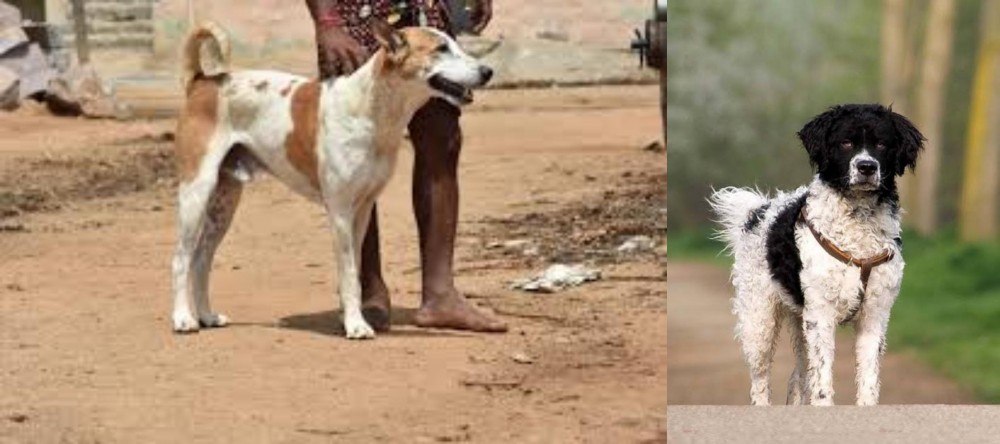 Pandikona is originated from India but Wetterhoun is originated from Netherlands. Pandikona may grow 7 cm / 3 inches higher than Wetterhoun. Both Pandikona and Wetterhoun are having almost same weight. Both Pandikona and Wetterhoun has almost same life span. Both Pandikona and Wetterhoun has almost same litter size. Pandikona requires Low Maintenance. But Wetterhoun requires Moderate Maintenance
Pandikona is originated from India but Wetterhoun is originated from Netherlands. Pandikona may grow 7 cm / 3 inches higher than Wetterhoun. Both Pandikona and Wetterhoun are having almost same weight. Both Pandikona and Wetterhoun has almost same life span. Both Pandikona and Wetterhoun has almost same litter size. Pandikona requires Low Maintenance. But Wetterhoun requires Moderate Maintenance
 The Pandikona hails from the village of Pandikona, India, but is in danger of becoming extinct. They have always been well adapted to the harsh conditions of the Kurnool district in India, and they are considered to be a primitive-type dog breed.
The Pandikona hails from the village of Pandikona, India, but is in danger of becoming extinct. They have always been well adapted to the harsh conditions of the Kurnool district in India, and they are considered to be a primitive-type dog breed.
It has always been a territorial dog that has been used to guard villages and today it’s a dog which isn’t recognized as a standardized breed by any of the major kennel clubs. It is essentially a companion dog today.
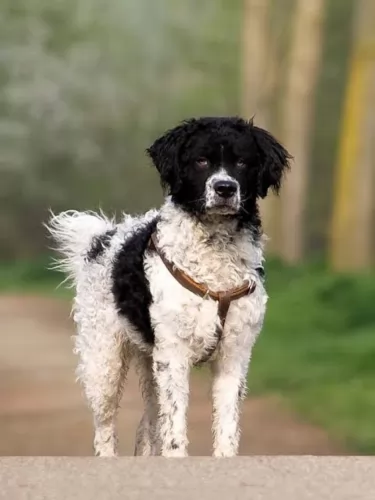 The Wetterhoun is a water dog developed in the 1500 or 1600s to hunt otters. The breed was developed by the Frisians in the Netherlands near the Northwest corner. In addition to catching otters in the lakes near by, they were also used as gundogs to hunt game. They are a fearless, tough and loyal working dog. They love the water and they are build for it with a waterproof coat and tight tail that is spiraled. They will swim happily in freezing cold weather as well.
The Wetterhoun is a water dog developed in the 1500 or 1600s to hunt otters. The breed was developed by the Frisians in the Netherlands near the Northwest corner. In addition to catching otters in the lakes near by, they were also used as gundogs to hunt game. They are a fearless, tough and loyal working dog. They love the water and they are build for it with a waterproof coat and tight tail that is spiraled. They will swim happily in freezing cold weather as well.
The Wetterhoun is rare and not seen outside of the Netherlands. Descendent of the Water Dog, that is now extinct, he is probably a relative of many spaniel types that also call the Water Dog their ancestor. Yet the Wetterhoun is not a spaniel or spaniel type.
The breed almost disappeared during World War II, like many others, they brought back and are now becoming more and more popular. The breed is only recognized by the Federation Cynologique Internationale and the United Kennel Club. AKC does not recognize them, but there are many hunting clubs and other registries that do. They are often promoted as one of the rare breeds.
 The Pandikona is a medium sized sighthound which stands at between 48 and 66cm in height and weighs in the region of 30 – 40kg. They are actually slightly built dogs, although the Pandikona can come in a variety of sizes as there is no selective breeding.
The Pandikona is a medium sized sighthound which stands at between 48 and 66cm in height and weighs in the region of 30 – 40kg. They are actually slightly built dogs, although the Pandikona can come in a variety of sizes as there is no selective breeding.
The breed’s coat is essentially short-haired and smooth with colors varying from solid fawn, white to black with white patches. Brindle is also sometimes seen. They are slim, muscular dogs with erect ears and a long tail that most times curves upwards.
These intelligent and very independent dogs are found roaming around Indian villages and guarding their owner’s property. They are territorial dogs, they are fearless too and make excellent guard dogs. They get on well with children as well as with pets, and with training they become loyal and faithful companions.
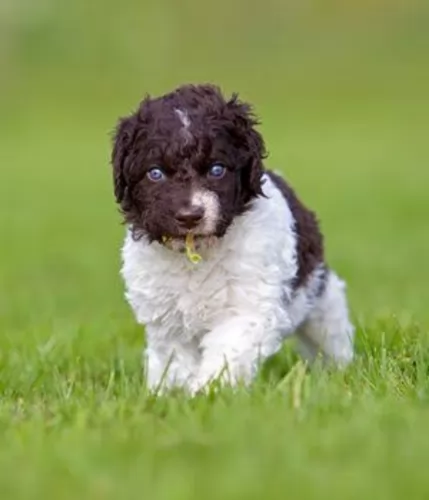 The Wetterhoun is a compact, medium sized breed weighing about 55 to 77 pounds. Great water dogs they are athletically built with low set ears hanging next to their heads, a waterproof coat, distinctive eyes with a very serious expression and a tightly curled tail held aloft over the back. Their coat is waterproof, somewhat oily, curly and thick. The fur is of a smoother texture on the ears, head, and legs. They can be solid black, solid brown, brown with white, or black with white.
The Wetterhoun is a compact, medium sized breed weighing about 55 to 77 pounds. Great water dogs they are athletically built with low set ears hanging next to their heads, a waterproof coat, distinctive eyes with a very serious expression and a tightly curled tail held aloft over the back. Their coat is waterproof, somewhat oily, curly and thick. The fur is of a smoother texture on the ears, head, and legs. They can be solid black, solid brown, brown with white, or black with white.
 The Pandikona may well be a primitive-type hunting dog from India but he is robust and low maintenance, and capable of making a splendid pet. That is one huge tick in his favor already.
The Pandikona may well be a primitive-type hunting dog from India but he is robust and low maintenance, and capable of making a splendid pet. That is one huge tick in his favor already.
He is an active dog who likes to be kept busy but that doesn’t mean he is too busy to give his human family his loyalty and companionship. Easy to keep, the Pandikona promises to make you the most fantastic pet and friend.
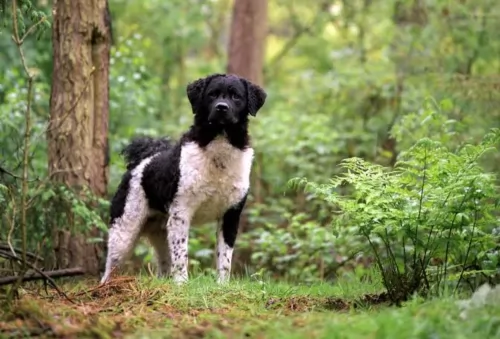 3.Adaptability – not a great apartment dog even though he is not that big. They need space. They need a job and they will finish their job at their own pace no matter what you say. It is impossible to train this trait out of them.
3.Adaptability – not a great apartment dog even though he is not that big. They need space. They need a job and they will finish their job at their own pace no matter what you say. It is impossible to train this trait out of them.
4.Learning ability Very high learning ability, very eager to learn and very smart. He is stubborn about finishing whatever job he is working on
 Dogs are totally dependent on us for their care, and it is our responsibility to keep our eyes on them to ensure they are happy and healthy. It can be to you and your pet’s benefit to know some of the most common health problems that dogs face.
Dogs are totally dependent on us for their care, and it is our responsibility to keep our eyes on them to ensure they are happy and healthy. It can be to you and your pet’s benefit to know some of the most common health problems that dogs face.
The Pandikona dogs are super hardy – used to roughing it - and they’re not going to require much veterinary care. Even though this is such a hardy dog, you can never tell if a sudden canine illness strikes your pet. Sometimes it will be necessary to get your pet to the vet to be examined and to receive medication.
This is very common in dogs and an ear infection can be triggered by dirt and wax in the ear, allergies and ear mites or something else. Your dog will be scratching at his ear, shaking his head, there will be redness and possibly discharge and a nasty odor. Don’t hesitate to take your pet to the vet.
Roundworms, tapeworms and hookworms are horrible parasites that can cause a whole lot of unpleasant symptoms in your dog. He could have a cough, a dull, listless coat, diarrhea, a lack of appetite and weight loss. Treatment from the vet will depend on the type of worm that has infested your pet.
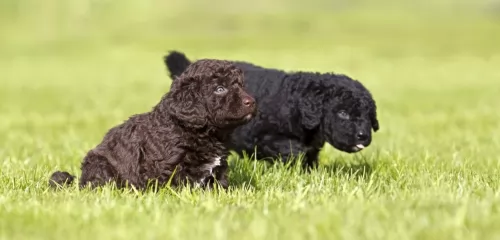 A hardy and healthy breed they do not have severe health issues. But like every his
A hardy and healthy breed they do not have severe health issues. But like every his
• Ear Infections – like any breed with hanging ears they can be prone to infection. This is particularly true because the dogs are in the water a lot. Be sure to clean and dry them after every water episode and inspect them on a regular basis even if the dog has not been in the water.
• Patellar Luxation – Knee cap issue with movement and inflammation. Can cause lameness and arthritis.
 There isn’t much information on the Pandikona but they have always spent their time roaming free around Indian villages. They’re used to having a lot of space to run and won’t do well in cramped spaces in the city. He wants to be busy and will certainly require you taking him on walks or allowing him to run free in a park. Ball games will also be appreciated as he loves lots of activity.
There isn’t much information on the Pandikona but they have always spent their time roaming free around Indian villages. They’re used to having a lot of space to run and won’t do well in cramped spaces in the city. He wants to be busy and will certainly require you taking him on walks or allowing him to run free in a park. Ball games will also be appreciated as he loves lots of activity.
Food is so very important to the health of dogs. As pets, the Pandikona deserves to have nutritious food which has all the right vitamins and minerals.
These days the best commercially manufactured dog foods can be a good choice for your pet and you choose these foods by reading the labels on the packaging and going according to the dog’s size, his activity levels and his age.
Dogs thrive on homemade food, especially when its simple and nutritious. Boiled chicken, some brown rice or pasta and some cooked vegetables such as sweet potato, spinach and carrots all chopped up and added into his kibble from time to time can only do him good. Some raw meat added in occasionally can also be immensely beneficial. Make sure he has always got a constant supply of fresh, cool water.
Check your Pandikona over from time to time. Check inside his ears for redness and signs of infection and check his eyes too. Brush him at least twice a week to get rid of dust and loose hairs. Trim his nails too and check inside his mouth for bad teeth.
Never ever leave him in a hot car or outside without shade and water. Make sure he has a nice dry comfortable place to sleep. He gives you unconditional love and companionship, and in exchange for this you want him to be well provided for.
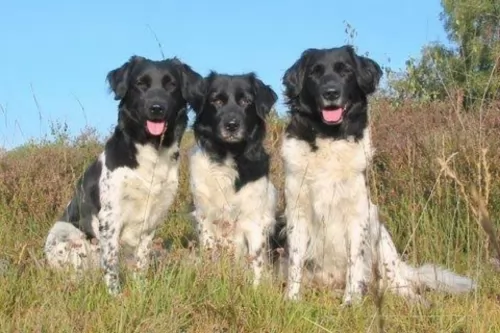 1Feeding the puppy -This is an active, hunting and swimming breed. They need good nutrition and high quality puppy food. A food formulated for active breeds or hunting dogs would be best. Feed your puppy in smaller amounts 3-4 times per day.
1Feeding the puppy -This is an active, hunting and swimming breed. They need good nutrition and high quality puppy food. A food formulated for active breeds or hunting dogs would be best. Feed your puppy in smaller amounts 3-4 times per day.
2.Feeding the adult - This is an active, hunting and swimming breed. They need good nutrition and high quality adult food. A food formulated for active breeds or hunting dogs would be best. Feed your adult twice per day.
4. Games and Exercises – This is an active working dog that needs a lot of exercise every day. A 30 minute walk is only the beginning. They need outdoor time to play and run. They need to swim if at all possible.